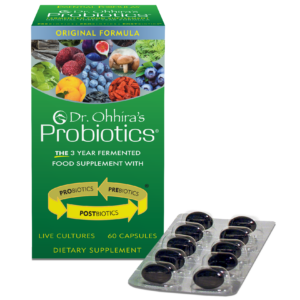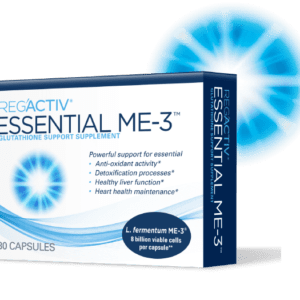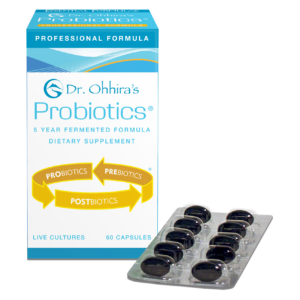The Wide-Ranging Benefits of Butyrate
By Ross Pelton, RPh, PhD, CCN
Scientific Director, Essential Formulas
Butyrate is a postbiotic metabolite produced by some strains of probiotic bacteria when they ferment non-digestible dietary fibers in the colon. Studies have documented that Butyrate, a short-chain fatty acid (SCFA), plays an essential role in regulating many health aspects. Butyrate is so critical that the authors of one study called it The Butyrate Revolution.i In this article, I will summarize and explain the many benefits of Butyrate and provide tips on how you can increase Butyrate’s production in your microbiome.
Butyrate Provides 10% of Your Daily Energy Needs.
The cells that line your gastrointestinal tract are a layer of 1-cell thick epithelial cells. In the colon, epithelial cells are also known as colonocytes. These cells have the highest turnover rate in the body; humans make an entirely new lining of the intestinal tract every 4 to 6 days. It takes an enormous amount of energy to renew all of these cells continually. Studies have revealed that about 10% of a human’s daily energy needs are required for the constant creation of new epithelial cells. The energy for this cellular renewal process does not come from the food you eat. It comes to the postbiotic metabolite butyrate, which is the primary source of energy for the renewal of the cells that line your intestinal tract.ii Butyrate’s benefits include the following:
Anti-Inflammatory Activity
The cells in the lining of the GI tract of people with dysbiosis are frequently inflamed. Butyrate has been shown to provide significant anti-inflammatory activity.iii
Accelerating Colonocyte Renewal
Butyrate’s anti-inflammatory activity, coupled with the fact that it is the primary source of energy for colonocytes, enables it to accelerate protein synthesis, which results in the growth of healthy new colonocytes.iv Accelerating healthy new colonocytes’ growth to replace old inflamed cells is a critical part of the healing process for individuals with dysbiosis.
Butyrate Regulates Immune Function
In animal and human studies, Butyrate has been shown to enhance macrophages’ activity, which in turn, regulates immune function. Butyrate-activated macrophages are more effective at lowering inflammation and directly killing pathogens. The authors of one study stated that Butyrate makes macrophages “Go Nuclear” against bacterial pathogens.v
Healing Leaky Gut
By increasing the production of epithelial cell tight junction proteins, Butyrate has been shown to protect and aid in the repair of cellular tight junctions. Thus, Butyrate plays a role in healing the condition known as leaky gut.vi
Butyrate and Skin Health
Studies have shown that Butyrate also influences the gut-skin axis and functions as a regulator of the skin immune system.vii In addition to providing energy for the renewal of healthy colonocytes and reducing oxidative stress, Butyrate also communicates with regulatory T-cells (T-Regs), which offers an anti-inflammatory activity that extends beyond the GI tract. Butyrate also stimulates the synthesis of collagen, which is an important structural component of skin.viii
Butyrate and the Brain
Butyrate-brain research conducted in animals suggests that Butyrate may have broad and significant effects on brain health. For example, when mice administered Butyrate, there is evidence of increased generation of new neuronsix, reduced oxidative stress and accelerated recovery following brain injuries.x
The Butyrate Paradox: Can Butyrate be Toxic?
Due to increased awareness of the importance of Butyrate, several companies are now selling oral butyrate supplements. But, increasing butyrate levels may not always be a good thing. Several studies have been published referring to the “Butyrate Paradox.”
In a healthy colon, Butyrate stimulates healthy new cells, which supports the renewal of the intestinal lining every 4 to 6 days. However, in an animal study, increasing butyrate levels in mice with colitis resulted in increased disease activity and a greater death rate than healthy controls.xi Therefore, it may not be appropriate to boost butyrate levels in people with dysbiosis or other gut inflammatory conditions such as ulcerative colitis.
The Fiber Gap
A lack of dietary fiber, referred to as The Fiber Gap, is increasingly being linked to depletion of the human gut microbiome and the astronomical rise in the incidence of chronic diseases.xii Studies have reported that approximately 90% of American children and adults DO NOT consume the recommended daily amount of dietary fiber.xiii
Because the diet of most Americans is severely deficient in the quantity and diversity of fiber, we can assume that most Americans’ microbiome is not producing adequate amounts of postbiotic metabolites, especially Butyrate.
How to Increase Butyrate
Only a few human-butyrate supplementation clinical trials have been conducted, and the outcomes have been inconsistent. Hence, at this time, I do not feel comfortable making butyrate supplementation recommendations.
The safest, the most effective way to increase the production butyrate is for people to let their microbiome do it naturally. To be effective, this involves the following two steps:
- Take Dr. Ohhira’s Probiotics daily, which delivers probiotics, prebiotics, and over 500 postbiotic metabolites is a very effective way to improve the composition of your microbiome.
- Increase the consumption of a diverse range of different types of fiber-rich foods. This enables an individual’s innate probiotic bacteria to ferment the dietary fibers and increase Butyrate’s production naturally.xiv
-
 Dr. Ohhira’s® Probiotic Supplements$13.95 – $89.95
Dr. Ohhira’s® Probiotic Supplements$13.95 – $89.95 -
 Reg´Activ® Essential ME-3$39.95
Reg´Activ® Essential ME-3$39.95 -
 Dr. Ohhira’s® Probiotics Professional Formula$39.95 – $129.65
Dr. Ohhira’s® Probiotics Professional Formula$39.95 – $129.65






